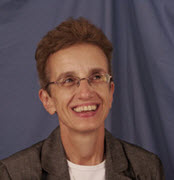Can Prayer Increase Positive Energy in the Universe?
Q: “My discussion group (‘God for Grownups’ in Michigan) has discussed your videos and work — would like to know more about implications for prayer. Not that we believe God is a ‘vending machine’ of favors but do you think prayer can focus the positive energy of the universe on a situation? How might we pray?”
 Ilia: My first response to this question is a resounding “Yes!” Prayer can focus the positive energy of the universe. Years ago Ann and Barry Ulanov wrote a very insightful book called Primary Speech: A Psychology of Prayer. Prayer is “primary” because it is uttered deep within the soul, a fundamental need for relationship. Prayer is the longing of the human heart for God as Saint Augustine recounts at the beginning of his Confessions: “You have made us for yourself O God and our hearts are restless until they rest in you.”[1] The Psalmist writes: “my happiness lies in You alone” (Ps 16:2).
Ilia: My first response to this question is a resounding “Yes!” Prayer can focus the positive energy of the universe. Years ago Ann and Barry Ulanov wrote a very insightful book called Primary Speech: A Psychology of Prayer. Prayer is “primary” because it is uttered deep within the soul, a fundamental need for relationship. Prayer is the longing of the human heart for God as Saint Augustine recounts at the beginning of his Confessions: “You have made us for yourself O God and our hearts are restless until they rest in you.”[1] The Psalmist writes: “my happiness lies in You alone” (Ps 16:2).
Prayer is not a one-sided relationship. It is not simply my longing for God but it is God’s longing for me as well. Prayer is awakening to the fact that the fulfillment of my life lies in God. God loves each person with a deep intimate love: “I have loved you with an everlasting love” (Jer 31:3). Prayer, therefore, is my desire for life and God’s desire to breathe in me the Spirit of new life, to draw me into the fullness of life. When I pray, when I breathe with God, I become part of the intimacy of God’s life.
Prayer is a conscious opening to new depths of relationship with God. Being open to the mystery of God, prayer is a dynamic movement of the spirit, a differentiation of being, as one ascends through the stages of consciousness into the realms of the divine mystery. This growth and transformation of consciousness requires vigilance, stability, and concentration of the mind travels past the realms of self-separateness into the infinite light within. Albert Einstein noted, because we are part of a whole, though limited in time and space. The experience of separateness is an optical illusion of one’s consciousness, which can restrict us from realizing our true reality of belonging to the whole. Ken Wilbur writes: “The ego is a contraction in the field of awareness.”[2] Einstein said, “our task is to free ourselves from this prison by widening our circle of compassion to embrace all living creatures and the whole of nature in its beauty.”[3] Prayer nurtures the inner universe and connects to the outer universe. As prayer deepens into contemplation, the inner and the outer realms of our existence become a single flow of life: outer space within. It is out of this higher, transformed self, forged in union with divine love and pure light that one contributes creatively to the world.
Teilhard spoke of religious experience as having evolutionary significance through centration of the universe. What he means, Martin Laird writes, is that the human person has the capacity to receive the Infinite. “The cultivation, development, and fulfillment of this capacity is a significant human contribution to cosmogenesis.”[4] The fulfillment of this capacity centrates the rest of the universe because the unitive experience with God unites all spaces of separation in the outer universe by filling them with the presence of divine love. Teilhard connects the act of faith with the centrating function of the human in the cosmos. The inner energy of faith and the transformation of consciousness shape the outer movements of the mystic. “Through divinization the mystic has become a doorway through which Christ-Omega enters and transforms the world in the Divine Milieu.”[5] This “inner-outer” transformation is the basis of human evolution and cosmic personalization. As the mystic goes about the world urging all things toward unity, she or he contributes to evolution through a process of mystical convergence, seeing everything bound in a luminous web of love.
In other words, only inner transformation can escape outer cosmic entropy and thus centrate energy on higher levels of complexity. Laird puts it this way:
As a correlative of spiritual energy, the energy of mysticism would refer to that increasing portion of cosmic energy currently advancing in the evolutionary process. Having the highest level of centeredness, mysticism bestows an immensely valuable element in the universe. Mysticism becomes a way of viewing the organizing, animating energy of cosmogenesis. Teilhard understands the universe to have a fundamental (created) orientation or inclination to seek out Christ-Omega. This is true at the level of matter, life, and most especially at the level of the human. The human’s orientation toward union with God in Christ-Omega is intimately connected with the continued centration of the whole of the groaning universe.[6]
Teilhard himself wrote frequently on mysticism and evolution and in his Divine Milieu he emphasized that the appearance of passivity in prayer, if it is ardent prayer deep in the heart of God, is the most vital activity of the cosmos:
Seeing the mystic immobile, crucified or rapt in prayer, some may perhaps think that his activity is in abeyance or has left this earth: they are mistaken. Nothing in the world is more intensely alive and active than purity and prayer, which hang like an unmoving light between the universe and God. Through their serene transparency flow the waves of creative power charged with natural virtues and with grace.[7]
Contemplation is somehow involved in the universal process of God’s relationship with the cosmos, as though this mystic mediates in some way God’s creative power. Prayer is the most intense energy of relationship and hence the most dynamic energy in the universe. Teilhard recounts a story of someone who comes upon a chapel wherein an elderly woman is praying.
All at once he sees the whole world bound up and moving and organizing itself around that out-of-the-way spot, in tune with the intensity and inflection of the desires of that puny praying figure. The convent chapel had become the axis about which the earth revolves.[8]
No matter where we are or what we are doing, if we are living out of a contemplative center of prayerful relationship with God, we will be a vital part of the cosmos, since our energy fields are entangled in the cosmos. Hence we can play a significant role in evolution, helping to direct the process toward unity in love.
In Teilhard’s view, contemplation, mysticism, deep prayer, however we enter into the depths of divine mystery and share in the wellspring of divine life, is the most important activity in the universe. Deep prayer is the vital energy of evolution because it is the most unified source of convergence between God and personal being. Prayer can change our world!
Notes
[1]The Confessions of St. Augustine, translated by John K. Ryan (New York: Image Books, 1960), 43.
[2] Ken Wilbur, The Essential Wilbur (Boston: Shambhala, 1998), 136.
[3] Albert Einstein quoted in Howard W. Eves, Mathematical Circles Adieu (Washington, D.C.: The Mathematical Association of America, 2002).
[4] Martin Laird, “The Diaphanous Universe: Mysticism in the Thought of Pierre Teilhard de Chardin,” Studies in Spirituality 4 (1994): 215.
[5] Laird, “The Diaphanous Universe,” 222.
[6] Martin Laird, “The Diaphanous Universe,” 218.
[7] Teilhard de Chardin, “The Mystical Milieu,” in Writings in Time of War, 144.
[8] Teilhard de Chardin, The Divine Milieu, 133.
 View print-friendly version
View print-friendly version
1 Comment
Related Posts

A Whiteheadian Response: The God of Persuasion
Question: “Please help me to further understand, I thought that God did not direct our lives. We made choices, those choices CREATED—God’s presence is in the creation of the choice…


[…] are specialists in science and religion that discuss how prayer releases positive energy to the universe around […]